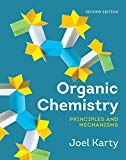
Organic Chemistry: Principles and Mechanisms (Second Edition)
2nd Edition
ISBN: 9780393663556
Author: Joel Karty
Publisher: W. W. Norton & Company
expand_more
expand_more
format_list_bulleted
Question
Chapter 4, Problem 4.73P
Interpretation Introduction
Interpretation:
The reason for more stability of
Concept introduction:
In monosubstituted compounds, the equatorial substituted conformer is more stable than the axial conformer due to 1, 3 diaxial interactions. But this depends on the substituent present on it. If the substituent is a hydroxyl group (OH group) present in axial position and can form hydrogen bonding with adjacent or near atoms like oxygen, then it prefers to occupy the axial position only.
Expert Solution & Answer
Want to see the full answer?
Check out a sample textbook solution
Students have asked these similar questions
Please correct answer and don't used hand raiting
Curved arrows are used to illustrate the flow of electrons. Using the provided
starting and product structures, draw the curved electron-pushing arrows for
the following reaction or mechanistic step(s).
Be sure to account for all bond-breaking and bond-making steps.
Select to Edit Arrows
H
H
Select to Add Arrows
>
H
CFCI:
Select to Edit Arrows
H
Select to Edit Arrows
Show work with explanation needed. don't give Ai generated solution
Chapter 4 Solutions
Organic Chemistry: Principles and Mechanisms (Second Edition)
Ch. 4 - Prob. 4.1PCh. 4 - Prob. 4.2PCh. 4 - Prob. 4.3PCh. 4 - Prob. 4.4PCh. 4 - Prob. 4.5PCh. 4 - Prob. 4.6PCh. 4 - Prob. 4.7PCh. 4 - Prob. 4.8PCh. 4 - Prob. 4.9PCh. 4 - Prob. 4.10P
Ch. 4 - Prob. 4.11PCh. 4 - Prob. 4.12PCh. 4 - Prob. 4.13PCh. 4 - Prob. 4.14PCh. 4 - Prob. 4.15PCh. 4 - Prob. 4.16PCh. 4 - Prob. 4.17PCh. 4 - Prob. 4.18PCh. 4 - Prob. 4.19PCh. 4 - Prob. 4.20PCh. 4 - Prob. 4.21PCh. 4 - Prob. 4.22PCh. 4 - Prob. 4.23PCh. 4 - Prob. 4.24PCh. 4 - Prob. 4.25PCh. 4 - Prob. 4.26PCh. 4 - Prob. 4.27PCh. 4 - Prob. 4.28PCh. 4 - Prob. 4.29PCh. 4 - Prob. 4.30PCh. 4 - Prob. 4.31PCh. 4 - Prob. 4.32PCh. 4 - Prob. 4.33PCh. 4 - Prob. 4.34PCh. 4 - Prob. 4.35PCh. 4 - Prob. 4.36PCh. 4 - Prob. 4.37PCh. 4 - Prob. 4.38PCh. 4 - Prob. 4.39PCh. 4 - Prob. 4.40PCh. 4 - Prob. 4.41PCh. 4 - Prob. 4.42PCh. 4 - Prob. 4.43PCh. 4 - Prob. 4.44PCh. 4 - Prob. 4.45PCh. 4 - Prob. 4.46PCh. 4 - Prob. 4.47PCh. 4 - Prob. 4.48PCh. 4 - Prob. 4.49PCh. 4 - Prob. 4.50PCh. 4 - Prob. 4.51PCh. 4 - Prob. 4.52PCh. 4 - Prob. 4.53PCh. 4 - Prob. 4.54PCh. 4 - Prob. 4.55PCh. 4 - Prob. 4.56PCh. 4 - Prob. 4.57PCh. 4 - Prob. 4.58PCh. 4 - Prob. 4.59PCh. 4 - Prob. 4.60PCh. 4 - Prob. 4.61PCh. 4 - Prob. 4.62PCh. 4 - Prob. 4.63PCh. 4 - Prob. 4.64PCh. 4 - Prob. 4.65PCh. 4 - Prob. 4.66PCh. 4 - Prob. 4.67PCh. 4 - Prob. 4.68PCh. 4 - Prob. 4.69PCh. 4 - Prob. 4.70PCh. 4 - Prob. 4.71PCh. 4 - Prob. 4.72PCh. 4 - Prob. 4.73PCh. 4 - Prob. 4.1YTCh. 4 - Prob. 4.2YTCh. 4 - Prob. 4.3YTCh. 4 - Prob. 4.4YTCh. 4 - Prob. 4.5YTCh. 4 - Prob. 4.6YTCh. 4 - Prob. 4.7YTCh. 4 - Prob. 4.8YTCh. 4 - Prob. 4.9YTCh. 4 - Prob. 4.10YTCh. 4 - Prob. 4.11YTCh. 4 - Prob. 4.12YTCh. 4 - Prob. 4.13YTCh. 4 - Prob. 4.14YTCh. 4 - Prob. 4.15YTCh. 4 - Prob. 4.16YTCh. 4 - Prob. 4.17YTCh. 4 - Prob. 4.18YTCh. 4 - Prob. 4.19YTCh. 4 - Prob. 4.20YTCh. 4 - Prob. 4.21YTCh. 4 - Prob. 4.22YTCh. 4 - Prob. 4.23YTCh. 4 - Prob. 4.24YTCh. 4 - Prob. 4.25YT
Knowledge Booster
Similar questions
arrow_back_ios
SEE MORE QUESTIONS
arrow_forward_ios
Recommended textbooks for you

 Organic ChemistryChemistryISBN:9781305580350Author:William H. Brown, Brent L. Iverson, Eric Anslyn, Christopher S. FootePublisher:Cengage Learning
Organic ChemistryChemistryISBN:9781305580350Author:William H. Brown, Brent L. Iverson, Eric Anslyn, Christopher S. FootePublisher:Cengage Learning


Organic Chemistry
Chemistry
ISBN:9781305580350
Author:William H. Brown, Brent L. Iverson, Eric Anslyn, Christopher S. Foote
Publisher:Cengage Learning